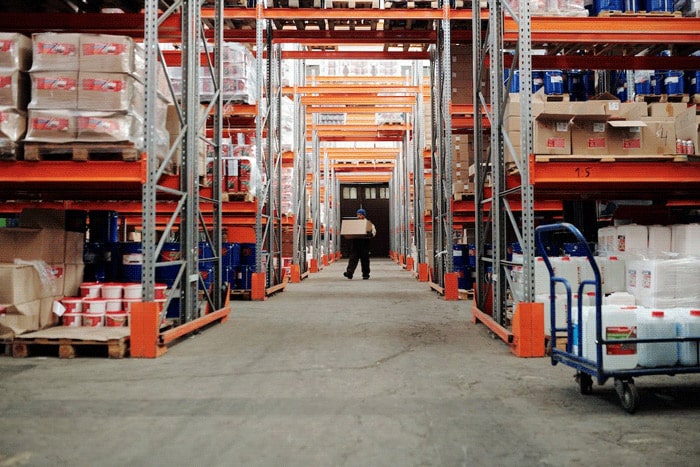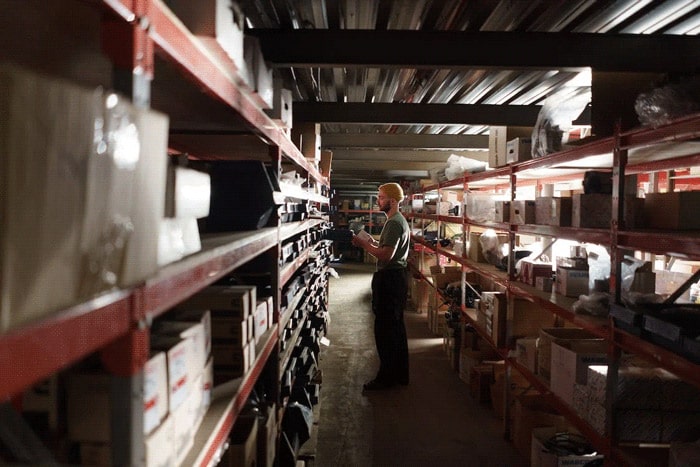
This post provides complete information on the receiving clerk job description and career, including the key duties, tasks, and responsibilities they commonly perform.
It also shows how to become a receiving clerk, the various career opportunities you can explore, and the requirements you need to meet to be hired for the role, as well as the salary you expect to earn as a receiving clerk.
What Does a Receiving Clerk Do?
A receiving clerk is the person who checks and unloads incoming shipments at a warehouse, a large retail store or distribution center.
The receiving clerk job description entails verifying that the correct amounts and types of items were shipped. It also involves inspecting the goods in order to ensure their quality.
Receiving clerks share similar job titles with shipping and inventory clerks.
This means they work in similar industries and perform same duties and responsibilities.
According to O*NET OnLine, the duties of a receiving clerk entails ensuring that incoming merchandise is verified and recorded correctly, and making arrangement for products to be transported.
After examining the order, the clerk then stores or stocks the items in their appropriate places.
Receiving clerks are responsible for contacting shippers directly if a problem or discrepancy is found and keeping careful records.
Generally, clerks at large and busy facilities are mainly responsible for manual labor duties.
They unload shipments from trucks, remove and dispose of packaging material, operate forklifts, stock items and hand trucks.
A receiving clerk is expected to have excellent vision and be in good physical condition. Organizational skills is also essential to make sure receiving tasks run smoothly and that items can be found easily whenever they are needed.
Clerks who work in smaller facilities oftentimes handle a larger set of responsibilities, like thoroughly checking shipments against original order forms so as to ensure the accuracy of the orders.
They often open boxes in the presence of delivery persons so as to make sure all items are intact and not damaged.
Their roles may also include making payment arrangements and signing for shipments as well.
Receiving Clerk Job Description Example/Sample/Template
The receiving clerk will be expected to perform some or all of the duties, tasks, and responsibilities shown in the job description example below for their companies:
- Count, weigh or measure items of incoming shipments in order to verify information against invoices, orders , bills of lading or other records
- Assemble cardboard or wooden containers or select preassembled containers
- Insert items into containers
- Examine and unpack incoming shipments; record shortages and reject damaged items
- Route items to various departments
- Examine incoming shipments to ensure they meet specifications
- Operate lift truck or hoist shipments from shipping and receiving platform to storage area
- Check in inbound inventory and administer the processing
- Trace and track shipments to ensure timely delivery
- Responsible for monitoring the returns process
- Sort, count, identify, verify and track all material by utilizing the Syteline to maintain accurate inventory records
- Verify receipts and log them according to required procedures
- Investigate and resolve situations where items received are not properly documented in the daily receipt log
- Regularly enter inventory data into Syteline on a timely basis
- Assist management in recycling material in the warehouse
- Cooperate with representatives from other departments in the organization to provide warehouse information as requested
- Perform regular material warehouse audits to ensure that material is undamaged and maintained neatly throughout the warehouse
- Advise management of cycle count issues on a timely basis
- Ensure that all documents and material received in the warehouse are of satisfactory quality
- Safely utilize forklifts cum power jacks to move warehouse materials according to proper safety instructions and as directed
Receiving Clerk Job Description for Resume
The work experience section and other sections of the receiving clerk resume can be prepared using information about the functions and responsibilities of the position from the sample job description given above.
Receiving Clerk Requirements: Skills, Abilities, and Knowledge for Career Success
Below are minimum requirements, including qualifications and qualities people vying for the post of receiving clerks should have to be employed by most employers.
- Previous experience with safe operation of forklift
- Previous experience with stretch-wrap equipment
- Must be able interpret documents such as operating and maintenance instructions, safety rules, and procedure manuals
- Ability to calculate mathematical values
- Must have a working knowledge of Internet software usage, order processing systems, inventory software and word processing software
- Must be knowledgeable in warehousing procedures
- Ability to give attention to detail is a must.
Receiving Clerk Employment
According to the United States Bureau of Labor Statistics, BLS’ report for 2023 on the shipping, inventory, and receiving clerk employment, there are 844,120 receiving clerks in the U.S.
Most receiving clerks are employed in the warehousing and storage industry (72,420 employed) and the merchant wholesalers, durable goods industry (40,770 employed).
Receiving Clerk Salary
In the United States, the average annual salary for a receiving clerk is $36149.
Dallas, TX, $43,849; Charlotte, NC, $43,014; Houston, TX, $42,993; Phoenix, AZ, $42,914; and Indianapolis, IN, $41,567 per year.
In the United States, there are currently over 550,493 receiving clerks employed.
Women make up 39.8% of all receiving clerks, while men make up 60.2%.
An employed receiving clerk is 43 years old on average.
White (60.1%) is the most common ethnicity among receiving clerks, followed by Hispanic or Latino (20.3%), Black or African American (11.2%), and Asian (5.8%).

Receiving Clerk Career Opportunities
Receiving clerks have various career opportunities to explore:
- Custodian
The main duties of a custodian are to maintain order, safety and security in the workplace, clean and maintain working areas, store equipment and materials, protect building and staff from inclement weather, and maintain a clean environment.
2. Mail Clerk (Delivery Clerk)
The main duties of a mail clerk are to sort incoming mail from other employees in the workplace.
This can be done by using several scanning machines that sort through a pile of letters or by using several conveyor belts with many different mail boxes.
3. Material Handler
The main duties of a material handler are to move materials throughout the workplace and use forklifts to transport materials.
They perform this task by using a smart board which directs the haulers to their destination. They are also expected to clean up spills or other messes in the workplace.
4. Laborer
The main duties of a laborer are to load and unload goods and materials, load and unpack goods onto trucks, move materials throughout the workplace, stock items and materials onto shelves, clean up spills or other messes in the workplace, and maintain order in the workplace.
5. Order Taker
The main duties of an order taker are to set and confirm orders, receive payment, sort and pack orders, arrange delivery, and maintain the workplace.
6. Stocker
A stocker is responsible for keeping an inventory of all the materials needed in their workplace.
They stock the materials needed for their workplace or for a product or service.
They also organize the different products needed in each area of their workplace.
The stockers then make sure that everything on the shelves is used properly by employees in the workplace.
7. Inventory Clerk
The main duties of an inventory clerk are to count products and materials, keep records of materials, make sure all stock is accounted for and maintain the workplace.
8. Shipping Clerk
The main duties of a shipping clerk are to receive packages or mail, process orders, prepare items for shipment by using packing machines, and help organize the workplace.
9. Warehouse Supervisor
A warehouse supervisor maintains a warehouse, supervises personnel, keeps records of materials and inventory, reports to management daily, and assists in the hiring process.
10. Warehouse Manager
A warehouse manager is responsible for the daily operations of the warehouse.
Their duties include maintaining inventory and supplies within the workplace, making sure that all employees are performing their jobs properly and complying with state laws, making decisions on company policies in the workplace, and reporting to management on issues within the workplace.
Challenges faced by Receiving Clerks on the Job
Some of the challenges faced by receiving Clerks on the Job are:
- Fast paced environment
One of the challenges faced by receiving clerks on the job is a fast-paced environment.
Receiving clerks are expected to perform many different tasks in a short period of time.
In this high paced environment, receiving clerks are required to multi task and must also be responsible for their own work load and that of others.
2. Heavy workloads
Another challenge faced by receiving clerks on the job is heavy workloads.
Receiving clerks must have strong organizational skills, a high level of accuracy, and good communication skills to effectively manage their workloads.
This can be especially challenging when someone is managing their own workload as well as the workloads of others.
Receiving clerks are expected to adapt and change methods quickly in order to keep up with the demands of the job.
3. Communication challenges
One of the challenges faced by receiving clerks is communicating with co-workers in order to complete their tasks effectively.
Receiving clerks must be able to effectively communicate their needs to co-workers in their workplace.
This can be challenging when there are many people in a small space and all of them want to talk at once.
Receiving Clerk Job Satisfaction
Receiving clerks in the United States are not satisfied or happy with their job.
This information is contained in the survey conducted by CareerExplorer.
The report of the survey, which was to determine how satisfied people were with their career showed that receiving clerks rated their job satisfaction 2.4 out of 5 stars.
How to Become a Receiving Clerk
To become a receiving clerk, here are steps you can follow:
- Think about getting a postsecondary education
While the receiving clerk career typically does not require more than a high school diploma, however, obtaining a postsecondary education can help you stand out among other job applicants.
Employers frequently prefer to hire clerks with formal business training.
Consider getting a Bachelor’s degree in business, office administration, accounting, or a similar field.
You can also take college courses on relevant business topics, such as office administration or accounting instead of pursuing a formal degree.
Consider computer training or enrolling in a forklift training course at a community or junior college if you want to improve your skills.
2. Obtain certification
Some employers require you to have an OSHA-approved forklift certification before or after you apply for a job.
When looking for work, find out if the positions you’re interested in require any certifications or hard skills.
Consider getting certified or taking specific courses based on your findings to help you meet the job’s requirements.
3. Get some work experience
Despite the fact that this is an entry-level position, you can impress hiring managers by gaining relevant experience prior to full-time employment.
Look for part-time or seasonal work as a shipping clerk or warehouse employee.
You can also work as an intern or shadow a receiving clerk at a local warehouse.
This not only gives you something to put on your resume, but it also allows you to experience a day in the life of a receiving clerk before entering the profession yourself.
4. Start working and complete on-the-job training
Look for receiving clerk positions in your area and apply for the ones that interest you.
When you are hired, you may receive on-the-job training from your supervisor or a clerk with sufficient experience.
During this time, you will learn how to monitor and track inventory, how to keep shipping records, and how the company operates as a whole.
Major Benefits of a Receiving Clerk Career
Some of the main benefits of the receiving clerk career are:
- Using the whole body
A receiving clerk’s daily job requires that they use their whole body to perform their work duties.
They work at a desk, nearby forklifts and on the warehouse floor throughout the day.
While sitting for long periods of time is one of the most common complaints of our modern jobs, receiving clerks do not necessarily have this issue.
2. Work benefits
A variety of direct work benefits can be given to receiving clerks in order to make them feel more valued.
Some benefits include: health insurance, life insurance, paid vacation and holidays, disability insurance, and retirement plans.
3. Get to deal with people
While receiving clerks complete tasks independently and must work on their own, they do have to work with people.
They must answer their phone when it rings, interact with team members and managers, and meet clients face to face on a daily basis.
4. Good job prospect
The major advantage of the receiving clerk career is that it is a good job prospect.
As long as you have an education in the field, you will be able to find work somewhere in a number of companies.
You could be hired by a manufacturing company, a wholesaler, or you can work in warehousing facility.
Receiving clerks are frequently hired by companies so that they have employees to complete their shipping and receiving tasks.
5. Interesting work environment
The receiving clerk job is an interesting one because it combines both the physical and mental abilities of individuals.
Receiving clerks must complete minute tasks, such as keeping track of the number of boxes shipped at any given time, and keeping the inventory count in their head at the same time.
They must also communicate with their managers, co-workers and clients efficiently.
6. Opportunity to learn new things
One of the best things about this career is that it is an opportunity to learn new things.
Receiving clerks usually start out as entry-level employees in a company but are given the chance to work their way up through the career ladder.
No matter where you go after you start your career as a receiving clerk, you will continue to learn new things and improve your skills on the job.
7. Advancement
If you decide to advance your receiving clerk career and give your best, you can work your way up to become a supervisor or even a manager.
However, it is important to note that your advancement depends on many factors, including what the position requires, how much experience you have, and the number of people who are applying for the same position.
Conclusion
Receiving clerks are important to a company because they hold the records of everything that comes in and out of the warehouse.
They are responsible for communications between the clients and suppliers, which is what makes them an integral part of the company they work for.
References:
U.S. Bureau of Labor Statistics
O*NET OnLine












